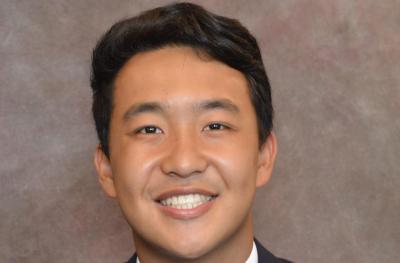Interview with Rhodes Scholar Henry Wu, OSU '20

Q: Why did you decide to major in Philosophy?
A: In high school, I was very much involved with speech and debate. I remember reading Rawls for the first time in high school. My debate coach at Upper Arlington High School was then an undergrad in the Philosophy Department, Troy Seagraves, who was coaching debate on the side. [Troy is now getting his Ph.D. in Philosophy at Purdue University.] One of my favorite things was hearing about what Troy was doing in his classes; I found that really interesting, learning about political philosophy, philosophy of law, and the basics of moral philosophy. As a high school student, philosophy was not a course that was offered so Troy did a good job of introducing us to some basic concepts and giving us a brief introduction to the practice of philosophy.
In my senior year, when I was visiting colleges, I came to Ohio State and I sat in on a Philosophy Department Colloquium. It was Tim Williamson’s talk on counter-factuals. As a high school senior, I didn’t understand much, but after the talk, I remember very well that the philosophy faculty were extremely engaged in the questioning. To me, it seemed like the kind of cross-examination we did in debate! I really appreciated that aspect of philosophy and seeing everyone engaged in the back and forth dialogue that was going on. So, I came into Ohio State wanting to study philosophy, and especially so that I could engage in that kind of academic debate and reasoning.
Q: Were there any faculty members who made a special impact on you here?
A: My first philosophy course at OSU was a Special Topics course in Philosophy of Science with Professor Chris Pincock, whom I later did an independent study and a research project with. I am grateful for the fact that the philosophy faculty are very open and accessible during office hours; I had very in-depth discussions with Professor Pincock about things I didn’t have a lot of background in. I am also really glad to have gone to Departmental talks as an undergraduate, where I explored so many different areas of philosophy, from philosophy of physics to ethics to philosophy of race. I’ve also recently gotten to know Professor Piers Turner. Studying with him cemented my interest in political theory and has also shaped my course plans at Oxford. The paper I worked on led me to recognize the importance of ideal theory and the value of philosophy: how theoretical concepts can serve as a guide to thinking about actual justice.
Q: Tell me more about how you think theoretical philosophy can inform your future projects on justice, immigration and trafficking.
A: In my first year as a Philosophy Major, I felt a need to learn about some of the issues that exist in the Central Ohio community. I had the realization that in these philosophy classes we are talking about freedom, we are talking about justice, but there are instances of human trafficking happening in Columbus that are not too far away from campus. But I didn’t see this as a reason to simply abandon the study of philosophy in favor of studying actual injustice. Rather, I think it is important to balance the study of philosophy with volunteering and being engaged with non-profits in the local community. Philosophy can guide our understanding of human rights: ideal concepts of justice and freedom can serve as a guide for structuring practical debates. Human trafficking is the worst violation of human freedom imaginable. But there is real complexity in what freedom means in some of these contexts. It was surprising to me to learn that trafficking victims do not often see themselves as victims of trafficking. Oftentimes, they feel a strong bond to their trafficker. Due to years of abuse, there is potentially an element of psychological control and psychological trauma. There is not exactly a perfect understanding of how “freedom” maps onto these real-world situations. But having a grasp of an ideal concept of freedom, and studying that in philosophy, gives a sense of the difficulty of understanding instances of actual injustice.
Lastly, I think there is great instrumental value for studying philosophy. Philosophy teaches you to be careful and cautious in your reasoning and to be humble in an epistemic sense. One needs to hear about diverse experiences to get a sense of what the issues are. It’s not enough to do research in your dorm, you have to go out into the community and hear from people who have had these sorts of experiences. For me, in working directly with trafficking survivors who are trying to get their criminal records expunged—they might have convictions for solicitation or prostitution—I start with the mindset of a philosopher: open, humble, transparent, honest. That’s not to say that when you are working with vulnerable populations you should aggressively question them! But, studying philosophy helps one engage in difficult discussions that are often required in a variety of careers.
Q: Is philosophy going be part of your course plan at Oxford?
A: I actually don’t know yet — I’m leaning towards a graduate program in political theory. The Rhodes Trust gives you time to think carefully about what to do. But, in general, I remain interested in broadly philosophical questions.
Q: So, you will be a lifelong philosopher.
A: Right!
